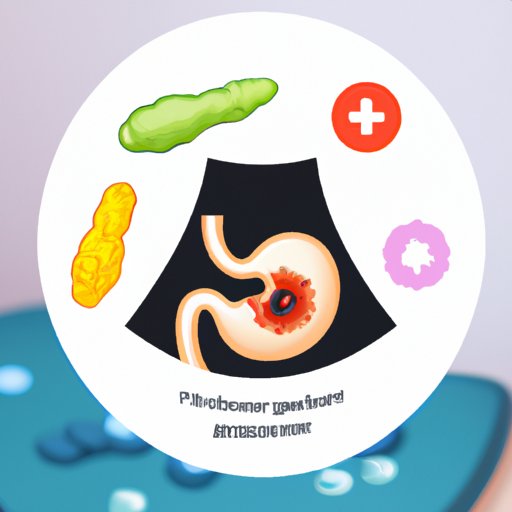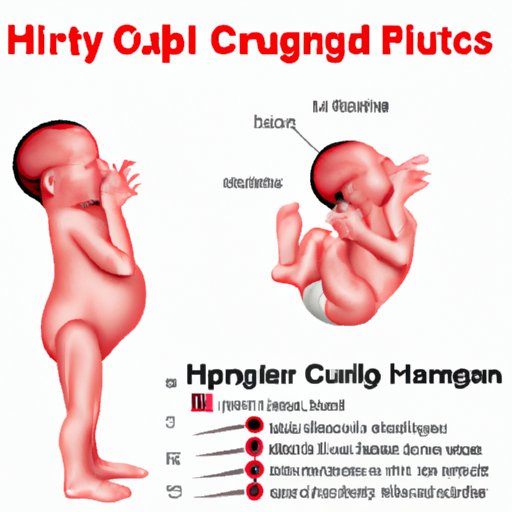Introduction
Pregnancy is an exciting time for parents, but with it comes many concerns and questions, especially when it comes to the health and development of the growing fetus. One common phenomenon that occurs during pregnancy is fetal hiccups. While they may seem concerning at first, fetal hiccups are actually a normal part of fetal development. This article will explore the science behind fetal hiccups, how they develop, their frequency and patterns, and the benefits and risks they pose to your future child. It will also provide information on what you can do to prevent and minimize fetal hiccups and when to contact your doctor if you have concerns.
The Science Behind Fetal Hiccups: Understanding Why They Occur
Fetal hiccups occur when the diaphragm, a muscle that separates the chest cavity from the abdominal cavity, contracts involuntarily. This muscle plays a vital role in the respiratory system, helping us breathe by pulling air into the lungs and pushing it out. However, in the fetal stage, the diaphragm is still developing and may contract unexpectedly, causing a hiccup-like movement.
According to research, fetal hiccups start occurring around the ninth week of pregnancy and can last throughout the entire duration of the pregnancy. Hiccups can occur multiple times a day or be sporadic and infrequent.
The causes of fetal hiccups are not fully understood, but many researchers believe that it is a way for the fetus to practice breathing and strengthen the diaphragm muscles in preparation for breathing air after birth. Others believe that it is a way for the fetus to regulate the amount of amniotic fluid they swallow and help develop the digestive system.
Inside the Womb: Exploring the Fascinating Phenomenon of Baby Hiccups
Fetal hiccups can vary in frequency and duration. Some babies may have them several times a day for a few minutes, while others may have them less often and for longer periods. Fetal hiccups can be detected by the mother, often as a repetitive twitching or jerking movement, which is different than the normal fetal movements she may experience. It is essential to note that `fetal hiccups should not be confused with seizures. Seizures can cause a repetitive or rhythmic movement, like hiccups, but are dangerous and should be immediately reported to your doctor.
Fetal movements and hiccups correspond to the developmental age of the fetus. For instance, early on in pregnancy, fetal movements are generally unnoticed by the mother. However, as the fetus grows, the movements, including hiccups, become more noticeable. Research suggests that the frequency of hiccups corresponds to how young or old the fetus is; very young fetuses can hiccup several times per minute. Regardless of the frequency or patterns of hiccups, the hiccups are just one of the many fascinating developmental milestones that occur in the womb.
Studies indicate that fetal movements, including hiccups, play a vital role in the development of the fetus. This movement helps strengthen the muscles and works to develop the nervous system. Additionally, movements like hiccups, allow the fetus to test and learn about the surrounding space.
From Rhythmic Movement to Hiccups: How a Fetus Develops in the Womb
The formation and development of the diaphragm are closely associated with the occurrence of fetal hiccups. The diaphragm is an essential muscle in the respiratory system, responsible for helping to inhale and exhale air into the lungs. Upon birth, this muscle functions as the primary driver, helping the infant take its first breath.
As a baby grows in the womb, the development of the diaphragm begins in the first trimester and is complete towards the end of the third trimester. The diaphragm closes off the abdominal and chest cavities, which are filled with a liquid known as amniotic fluid, which acts as a watery cushion. Once developed, the baby learns to breathe by inhaling and exhaling the amniotic fluid, which contains nutrients, oxygen and carbon dioxide and helps prepare the respiratory system for birth and life outside the womb.
The diaphragm is a sheet-like muscle that separates the thorax from the abdomen in the fetus. It descends to release gases of the fetal digestive tract and to help regulate the influx of amniotic fluid through the trachea.
Hiccupping Womb Buddies: Unraveling the Mystery of Fetal Hiccups
Many mothers report feeling their baby hiccuping by late pregnancy. Though there is no way of knowing whether all fetuses hiccup in the womb, some mothers have noted rhythmic movements that feel like a baby’s hiccups. At about 28 weeks pregnant, a mother can experience regular fetal movement along with early developmental milestones that include twitching of the eyes and sucking the thumb.
The sensations for fetal hiccups can vary among mothers depending on what position the baby is in and how far along they are in their pregnancy. As the baby grows and begins to position itself head down, the mother can feel the hiccups in the lower part of her belly, in the pelvic or vaginal region.
Detection of fetal hiccups during ultrasound rises with the presence or absence of other associated conditions, like mom’s age, anxiety levels, and other observable maternal conditions. Therefore, it is crucial to pay attention to fetal movements and inform your doctor if you experience something unusual.

In Utero Hiccupping: The Surprising Benefits and Risks for Your Future Child
Fetal hiccups occur even in healthy, normal pregnancies, and are not usually a cause for concern. In fact, fetal hiccups often have a positive impact on fetal development, indicating a healthy, thriving baby. There is evidence to suggest that fetal hiccups can also help improve fetal brain development while playing an integral role in preparing the diaphragm for breathing.
Despite the many benefits of fetal hiccups, there are some risks associated with them. For instance, frequent hiccups can cause irritation and discomfort for the mother and are often associated with a high intake of amniotic fluid. Additionally, prolonged or persistent hiccups can indicate problems with the development of other fetal systems, leading to complications later in life.
If you experience persistent, or unusually frequent hiccups and are concerned, it is important to discuss it with your doctor and consider seeking additional medical consultation if necessary.
Everything You Need to Know About Fetal Hiccups and What They Mean for Your Pregnancy
While fetal hiccups are a normal part of fetal development, they can be annoying and uncomfortable, leading to concerns among expectant parents. It is crucial to note that fetal hiccups do not cause harm to your baby, nor does it cause harm to the mother. While there is no way to prevent fetal hiccups, there are things you can do to minimize your discomfort and the frequency of hiccups.
If you experience frequent hiccups, changing positions is an effective way to reduce discomfort and avoid igniting further contractions. Regular hydrating, avoiding processed or overly spicy foods, and getting ample rest will also help. In the long run, keeping your pregnancy stress levels down can prove beneficial.
If you are concerned about the frequency or patterns of fetal hiccups, your doctor can help put your mind at ease or investigate further. You may want to consult with a fetal medicine specialist or perinatologist if further testing is required. Keep in mind that fetal hiccups are normal and an expected part of fetal development.
Conclusion
In conclusion, understanding the science of fetal hiccups is essential for expectant mothers and their partners. It helps alleviate concerns and appreciate the amazing things that happen during pregnancy. While fetal hiccups may raise questions and concerns, it’s an essential part of fetal development, indicating a thriving baby. However, If you are ever concerned about the hiccups, chat with your doctor and ask for a second opinion.
Remember that the journey to welcoming your child into the world is unique to you and that support is available from medical experts and registered practitioners alike. Relax, enjoy your pregnancy, and soak up the many wonders it brings!
Resources for Further Reading
BabyCenter, “Fetal hiccups: Why do babies get hiccups in the womb?”
NLM, “Fetal breathing movements and hiccups.”
NHS, “You and your baby at 29-32 weeks pregnant.
